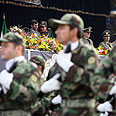
Iran's killing spree stifles Arab spring
Tehran pursues campaign of public intimidation, covert killing to subdue political opposition, quell turbulence caused by the region's revolts
As the Arab spring flourishes throughout the Middle East, Iran, one of the region's most prominent targets on Amnesty International's watch list seems to be an "island of calm".
The reason, according to Iranian human rights groups, international watchdogs and country experts is that Tehran is pursuing a campaign of public intimidation and covert killing to subdue political opposition and quell turbulence caused by the region's revolts while claiming that it is cracking down on drug trafficking and other criminal activity.
- Receive Ynetnews updates directly to your desktop
According to Amnesty International, Iran has admitted executing 190 people between January and the end of June this year; an additional 130 reported executions have gone unacknowledged. These figures put Iran on course for a record year for capital punishment. In 2010, 252 people were executed, according to official figures, with 300 more also believed to have been killed.
In a report on Iran's "judicial killing spree" Britain's Guardian newspaper presents testimonies from various human rights organizations that claim to have a truer picture of the human rights situation in Iran.
Iran Human Rights, an independent monitoring organization alleged that 25 people were hanged in one day, July 3, in Ghezel Hesar prison in Karaj, west of Tehran. The hangings, supposedly all drug-related, were not reported by official media. The same report said another seven people were hanged the same day in Evin prison in Tehran. It alluded to further uncorroborated mass executions in prisons in Khorasan province in 2010.
The number of public hangings is also on the increase. Since the start of 2011, up to 13 men have been executed in public, eight of them since 16 April, an Amnesty report this year stated.
Execution 'binge'
Iran meanwhile reportedly defied international law to become one of the only countries to execute two juvenile offenders on 20 April. Overall, Iran's execution "average" is running at almost two people per day in 2011, making the regime the world's number two executioner after China.
Decrying Iran's execution "binge", Mark Wallace, a former US ambassador and president of the United Against Nuclear Iran action group, said Tehran must be forced to stop. In an article for the Los Angeles Times he said "the international community needs to call for an end to this kind of barbarism and highlight more broadly the deteriorating human rights situation".
"It is no coincidence that Iran's increased staging of public executions came at the same time protest movements were gaining steam through the Middle East. What better way to keep Iranians from having 'dangerous ideas' like those of their neighbors?
"And it should come as little surprise that Iran is now aiding other governments in the region, notably Syria, in their efforts to suppress domestic uprisings." This latter claim was recently corroborated by the US treasury department.
Shirin Ebadi, the Iranian Nobel peace prizewinner, joined human rights organizations in February this year in appealing to Iran to impose a moratorium on executions – but after a brief pause following a spate of adverse international publicity; the pace of judicial killings has accelerated again.
"The Iranian authorities have shown that they are no longer content to repress those contesting the re-election of Mahmoud Ahmadinejad by arresting and convicting them – they have shown they will now resort to execution.
"They are using the familiar tactic of carrying out political executions at the same time as mass executions of prisoners convicted of criminal offences. These executions may increase if the world is silent," Ebadi said.
- Follow Ynetnews on Facebook










